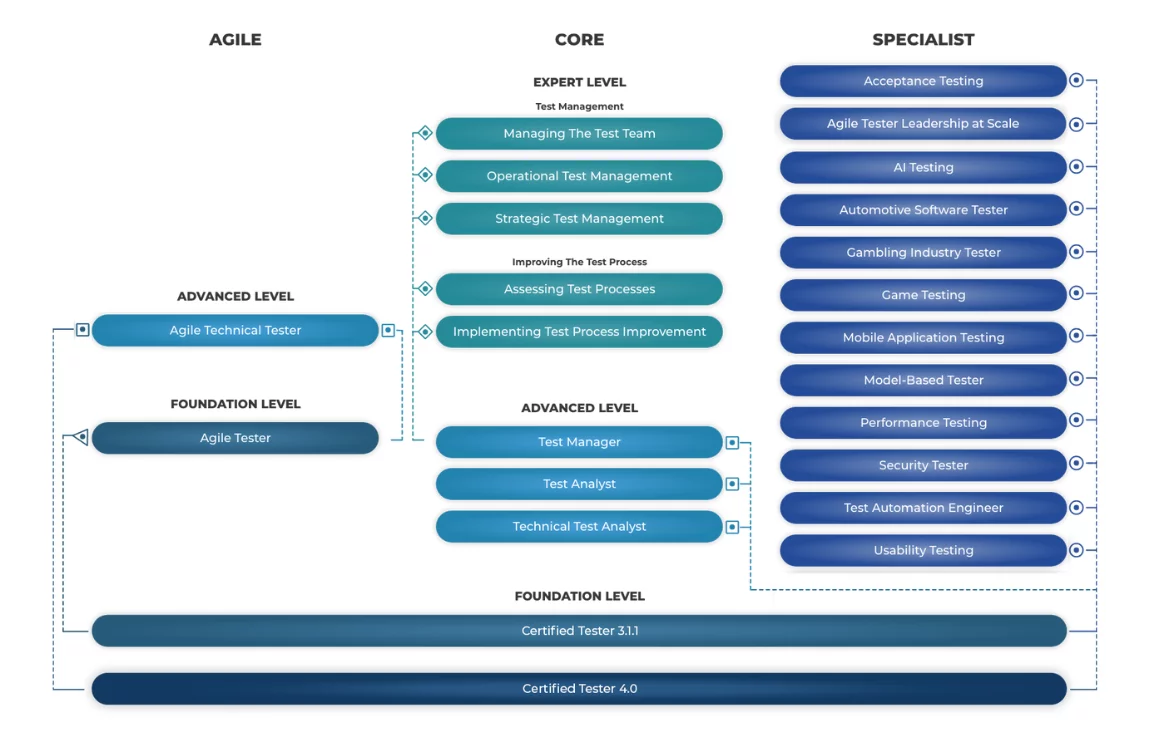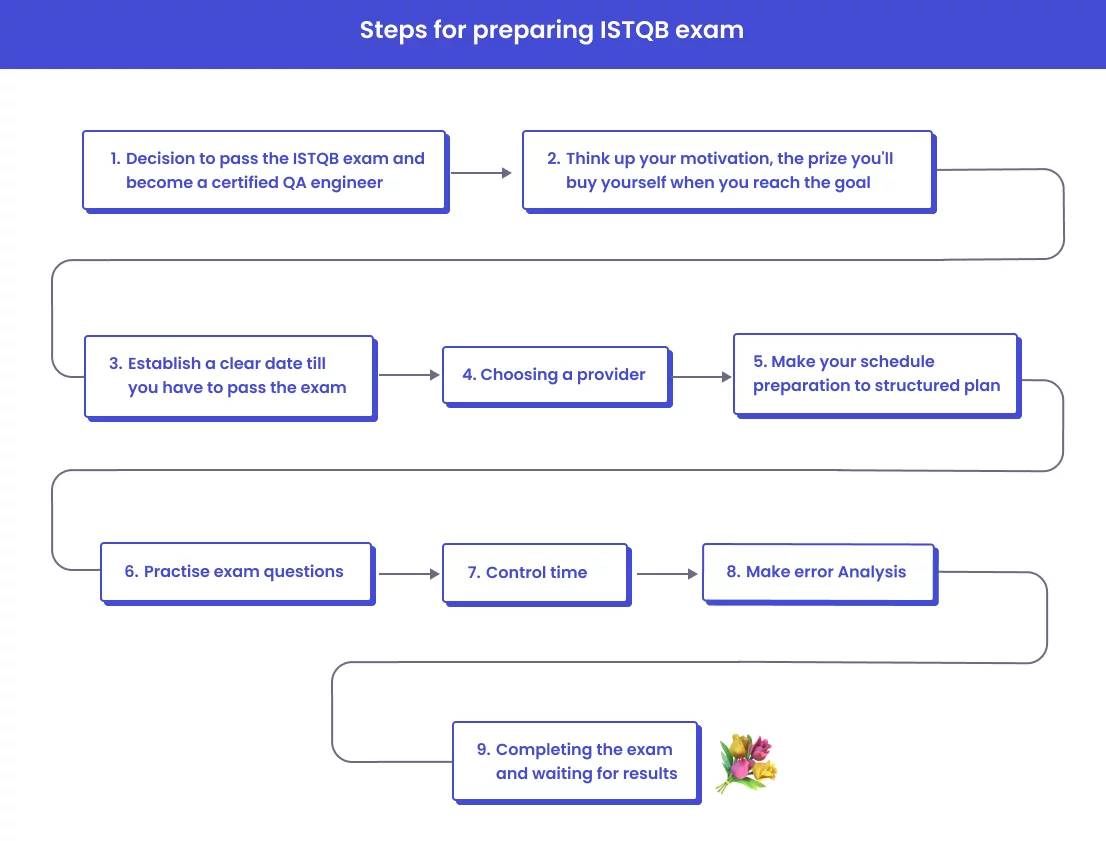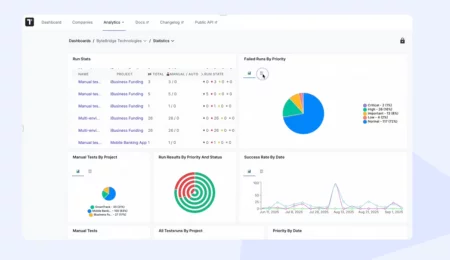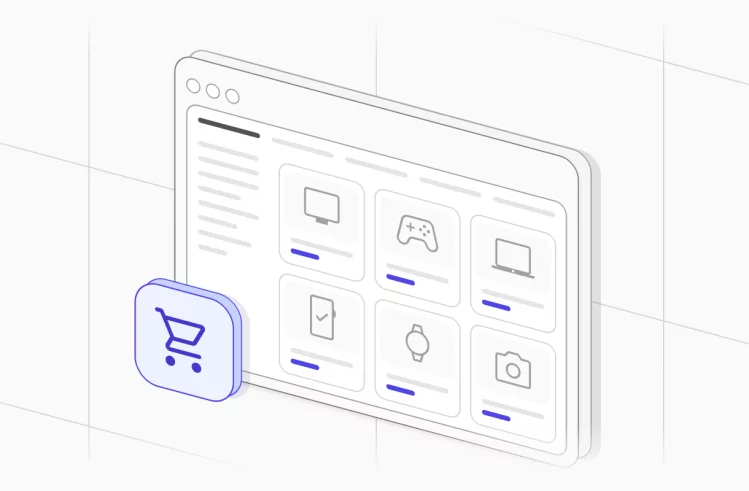Many people think that preparing for the ISTQB exam on their own is difficult, if not impossible. But that’s not true at all! Self-study is entirely feasible, and many people successfully pass the exam with their own preparation 🎉
My name is Amina, I am a Middle General QA Engineer. Have experience testing CRM systems, real estate projects, and big data projects. I test Web, Mobile and also do automation. I am an ISTQB Certified Tester, and I have noticed that this topic has become very relevant lately. More and more employers want their employees to have this certification. Now, I would like to share a bit about ISTQB and my experience with passing the Foundation Level (FL) exam, answering some of the most common questions you might have along the way. Let’s get started 😀
What is ISTQB and why is it needed?
ISTQB (International Software Testing Qualifications Board) is an international organization that develops standards for the qualification of professionals in the field of software testing.
An ISTQB certificate validates a tester’s knowledge and skills in accordance with international standards. It is useful for enhancing professional reputation, assists in job searching, and can serve as an additional argument for salary increases.
Main Types of ISTQB Certificates
- Foundation ISTQB Level. It is suitable for beginners and covers the basic concepts of testing.
- Advanced ISTQB Level (Test Analyst, Technical Test Analyst, Test Manager). Designed for experienced testers, covering more in-depth aspects of testing.
- Expert ISTQB Level (Managing The Test Team, Operational Test Management, Strategic Test Management). The highest level of certification, aimed at professionals with extensive experience.

Validity of the Certificate
ISTQB certificates do not have an expiration date (except for the Expert level), meaning they do not need to be renewed or retake exams.
Advantages of ISTQB Certification
- Enhancing Competencies. Certification provides an understanding of the basic concepts and practices of testing, which helps in daily work.
- Employer Recognition. Many foreign companies prefer certified professionals during hiring.
- Improved Career Prospects. ISTQB certification can help in obtaining a higher position or a salary increase.
- Global Recognition. The certificate is recognized worldwide.
How to register for the exam and choose a provider
To register for the exam, you need to select a certification provider. The most popular providers are:
- iSQI
- GASQ
- BCS
What to Pay Attention To 🔴
- Exam Cost. This may vary among different providers
- Exam Format. Online or offline
- Available Dates and Locations. If taking the exam offline
- Retaking Policy.
ISTQB exam fees and number of attempts
The price ranges from $150 to $300 depending on the certification level and provider. Typically, each exam attempt requires a separate fee. However, you can opt for a 2TRY package with an additional payment to receive a second attempt for free.
ISTQB exam formats
- Online. Taking the exam from home or office using special proctoring software.
- Offline. Traditional format at a certification center.
ISTQB Exam Structure
- The Foundation Level exam consists of 40 multiple-choice questions
- Each question is worth exactly 1 point
- The maximum possible score for each examination is 40 points
- A score of 65% (26 points or more is required to pass
- The time allowed for each examination 60 minutes
- If the examination is not native 15 minutes allowed
The sample ISTQB exam questions can be found here.
ISTQB Passing Score
To pass the exam, you need to score at least 65% correct answers (i.e., 26 out of 40), look at top.
ISTQB Preparation Time
For the Foundation Level, preparation usually takes between 2 to 4 weeks before the final test, depending on experience. It is advisable to allocate time for daily study sessions about 2.5–3 hours and practicing tests.
How to pass ISTQB exam quickly and painlessly?
Don’t worry—it is not as difficult as you might think. The key is staying focused, not letting fear get in the way, and tuning out any discouraging voices of somebody in your QA community. These are more than enough to pass the exam on your own if you stay focused on understanding key QA concepts.
📖 Essential ISTQB Resources:
- Syllabus: You can download it from the official ISTQB website.
- Book: I recommend “A Study Guide to the ISTQB Foundation Level” by Adam Roman. You can buy it on Google or Amazon for instance or try borrowing it from friends.
- Glossary: Your reliable assistant for deciphering unfamiliar terms.
But if you have people with whom you could communicate directly and ask questions it is a big plus. Especially already ISTQB-certified QAs to discuss different topics and practical tasks if they explain the material to you in a simpler way. Do not fear ask them!
Preparation tools for ISTQB exam
- Printed syllabus;
- Markers;
- Pencil/pen;
- Sticky notes.
How to check your knowledge
✅ Use only the official mock tests from ISTQB.
❗️Avoid internet tests as they might be inaccurate.
What do you need to take the ISTQB exam online?
→ A laptop (with at least a 13″ screen) with a working camera, microphone, and screen-sharing capability.
→ A phone with a working camera.
Rules for taking the exam at home
→ Food and drinks are prohibited (only a transparent glass of water and tablets if needed are allowed, but you must notify in advance).
→ The desk must be empty.
→ The room should be isolated with non-transparent doors.
→ Remove or cover with a thick cloth any TVs or other devices if possible.
→ Headphones are not allowed.
→ The room must be closed during the exam, and no one should enter.
My Tips for Taking the Exam
- Read the question first, then the scenario (especially for long questions).
- Pay attention to words like NOT, MOST LIKELY, etc.
- If a question includes NOT, read it again after selecting your answer.
- The most straightforward and obvious answers are often correct. Do not be afraid to choose them.
- For pairing questions, use the elimination method.
- If a question seems difficult, skip it and come back later.
- If a question looks long but you are confident you can solve it quickly, go ahead and tackle it.
- Keep track of time. If you are stuck on a question for more than 2 minutes, move on to the next one.
- If you have a habit of changing correct answers to incorrect ones, do not review questions at the end to avoid temptation.
- For questions requiring calculations, write down everything. Do not do the math in your head!
Remember that you are prepared well, so focus on answering the questions without feeling time pressure. Try to stay calm, keep your concentration — this will help you make the most of your knowledge and ensure you perform at your best.
Strategies to pass the ISTQB exam
Typically we are working over 40 hours a week, trying to balance a personal life, social life, and healthy life. Your days can get really busy. So you can not expect a successful exam result if you do not plan this time. It is best to start planning early to have enough time to cover all topics.
Keep in mind, that a structured approach is the key to success! Divide the subject you are going to learn into smaller, manageable units, such as the software life cycle, various test techniques and test management. Set yourself realistic learning goals per day and focus on one topic per week to avoid being overwhelmed.
I encourage you to develop your own action plan that works best for you, below is only an example:

That’s all🎉 it’s really simply – just do it! If you have questions about the exam process itself, feel free to leave comments! It’s an important topic, and I’m happy to share my experience!
Frequently asked questions
What are the benefits of ISTQB?

If you successfully pass the exam. Not only will you gain the prestigious ISTQB certification, but you will also showcase yourself as a skilled and knowledgeable QA professional. The ISTQB certification is an internationally recognized standard in the field of Software Quality Assurance. It might open some career opportunities, including higher salaries. The ISTQB Foundation Level certificate also opens the door to further certifications such as the Advanced Level or Expert Level, which can further improve your career prospects.
How difficult is the ISTQB foundation level?

The exam questions require precise answers and cover a wide range of topics covered in the ISTQB syllabus. But it is not just about learning the content, but also about systematically training the exam questions, personal time management and dealing with stress on the day of the exam.
Anyway, the exam requires an understanding of the SDLC (Software Development Life Cycle), Testing techniques and Test Management, as well as Defect Management e.g.
Are ISTQB certifications worth it?

Whether or not an ISTQB certification is worth it depends on your individual goals and circumstances. In general, the ISTQB certification is a valuable investment of time and effort for QA professionals, as it provides a standardized approach to testing and is widely recognized by organizations around the world. In the few last years, the level of satisfaction who have passed it grew incredibly.








